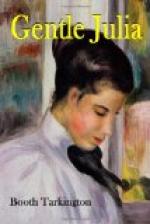The hateful entreaty still murmured in her resentful ears, that night, as she fell asleep; and she passed into the beginnings of a dream with her lips slightly dimpling the surface of her pillow in belated repartee. And upon waking, though it was Sunday, her first words, half slumbrous in the silence of the morning, were, “Vile Things!” Her faculties became more alert during the preparation of a toilet that was to serve not only for breakfast, but with the addition of gloves, a hat, and a blue-velvet coat, for Church and Sunday-school as well; and she planned a hundred vengeances. That is to say, her mind did not occupy itself with plots possible to make real; but rather it dabbled among those fragmentary visions that love to overlap and displace one another upon the changeful retina of the mind’s eye.
In all of these pictures, wherein prevailingly she seemed to be some sort of deathly powerful Queen of Poetry, the postures assumed by the figures of Messrs. Atwater and Rooter (both in an extremity of rags) were miserably suppliant. So she soothed herself a little—but not long. Herbert, in the next pew, in church, and Henry in the next beyond that, were perfect compositions in smugness. They were cold, contented, aristocratic; and had an imperturbable understanding between themselves (even then perceptible to the sensitive Florence) that she was a nuisance now capably disposed of by their beautiful discovery of “Say not so!” Florence’s feelings were unbecoming to the place and occasion.
But at four o’clock, that afternoon, she was assuaged into a milder condition by the arrival, according to an agreement made in Sunday-school, of the popular Miss Patty Fairchild.
Patty was thirteen and a half; an exquisite person with gold-dusted hair, eyes of singing blue, and an alluring air of sweet self-consciousness. Henry Rooter and Herbert Illingsworth Atwater, Jr., out gathering news, saw her entering Florence’s gate, and immediately forgot that they were reporters. They became silent, gradually moving toward the house of their newspaper’s sole poetess.
Florence and Patty occupied themselves indoors for half an hour; then went out in the yard to study a mole’s tunnel that had interested Florence recently. They followed it across the lawn at the south side of the house, discussing the habits of moles and other matters of zooelogy; and finally lost the track near the fence, which was here the “side fence” and higher than their heads. Patty looked through a knot-hole to see if the tunnel was visible in the next yard, but, without reporting upon her observations, she turned, as if carelessly, and leaned back against the fence, covering the knot-hole.
“Florence,” she said, in a tone softer than she had been using heretofore;—“Florence, do you know what I think?”
“No. Could you see any more tracks over there?”
“Florence,” said Patty;—“I was just going to tell you something, only maybe I better not.”




